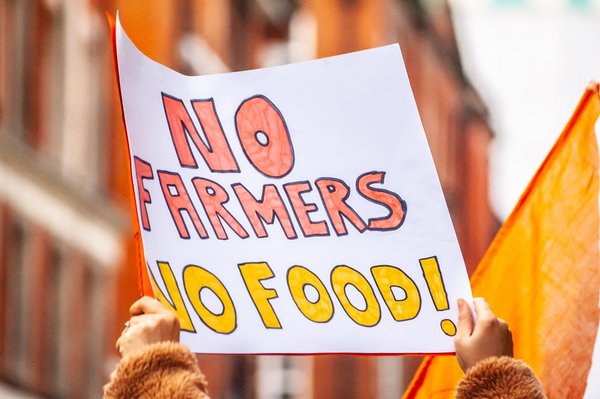- Share this article
- Subscribe to our newsletter
Indian farmers resume protests to demand price protection for their crops
Farmers in their thousands are heading for the Indian capital, protesting at what they claim has been the Federal Government’s failure to fulfil its promises to review the issue of guaranteed minimum prices for their produce. Several farmers have already been injured on their march, resisting tear-gassing and crackdowns by police and facing huge concrete barricades.
While the Modi government has already held four rounds of negotiations with the farmers, no agreement has been reached so far. “The negotiations with the government are going on, and we hope that the government will act promptly and fulfil our demands. But we will continue the protests until they are met,” says farmer leader Sarvan Singh Pandher.
Farmers demand legally binding Minimum Support Price
The farmers, who started their campaign on February 13th, are pushing for a legally binding Minimum Support Price (MSP) which would make it mandatory for the Government to procure their crops, preventing them from incurring losses when the prices fall very low. The MSP is determined annually by a government agency, the Commission for Agricultural Costs and Prices (CACP), which would consider factors like production costs, market trends and demand-supply dynamics. The CACP would then submit its recommendations to a committee headed by the Indian Prime Minister, who would then make the final decision on MSP levels. While the MSP is at the core of the fresh agitation of farmers in India, their other demands include pensions for farmers and farm labourers, farm debt waiver and withdrawal of cases against the farmers which were filed against them during previous protests.
Already in 2020-21, thousands of farmers from different Indian states had staged campaigns in the Indian capital for months forcing the Modi government to withdraw controversial agricultural reforms. Scores of farmers had died during the months-long protests, also because of exposure to cold weather and heat-waves. The farmers had ended their protests in 2021 following the government’s repealing the reforms and promising that their demand for the MSP would be seriously considered. A guarantee for an official approval of the MSP in the form of new legislation was a condition set by the farmers when they withdrew their agitation. However, farmers say that despite several reminders, the government has failed to fulfil its promises that their demands would be met during its term of office.
Activists and experts who support the farmers’ demands assert that the MSP will not only help the Indian farmers to secure their livelihoods, but will also put India’s agricultural economy on the path of progress. “MSP will be just a legal instrument. When farmers demand MSP, they don’t mean that the government should procure everything,” says agricultural policy expert Devinder Sharma. According to Sharma, MSP will be a benchmark price below which nobody will purchase – be it the traders or public agencies. “So, the government doesn’t have to come into play. Only at certain times may the government's intervention be required,” he says.
Sharma says that when there is too much production of crops and farmers are not able to sell their produce, the government must pay them the MSP. “That is done even in a country like America. When there is a surplus of milk, the farmers are paid. Similarly, farmers in India should also get such price protection,” Sharma says.
Seizing the moment
The farmers' issue is said to be a great challenge for the Modi government, with general elections in India scheduled for April or May. Farmers form a large chunk of votes in India, and no political party would want to take any chances with their vote bank when general elections are round the corner. Narendra Modi’s government or his Bhartiya Janata Party (BJP), which is known for making wise electoral calculations, are not expected to let the farmers’ protests to cost them electorally, especially given that the BJP’s political opponent, the Indian National Congress, is supporting the farmers and has assured them of providing a legal guarantee on MSP if it wins the upcoming elections. So the farmers appear to be presented with a great opportunity!
Author: Athar Parvaiz is a freelance journalist based in Srinagar/ Kashmir, India. Contact: atharparvaiz.ami(at)gmail.com





Add a comment
Be the First to Comment